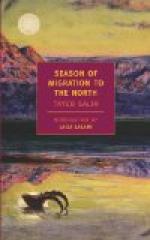It is one hundred and twenty years since Mackenzie descended this stream to its mouth, “discovering” a river along whose shores centuries before had smoked the watch-fires and risen the tepees of an anterior race, wanderers from Asia, who here, guiltless alike of onlooker or chronicler, lived and loved and worked out their drama of life. Age follows age, a new generation is evolved in the new habitat, and in time these once-migrants from Asia are dubbed “the red men” and “the American Indian.”
We watch out the night with Tenny Gouley. In the early morning, sharply turning a corner, we flush a mixed family of water-fowl—gulls in great variety, something that looks like a brant, and a loon with its uncanny laughter. Snipe are on every batture, and sand-pipers, with kingfishers and all the lesser waders. The boreal summer is short and if broods are to be raised there is no time to waste. A riot of blossoms fringes the banks—the uplifted magenta torches of the fireweed, tufts of vivid golden-rod, the pink petals of the rose, and a clustering carpet of moss dotted with the dead white of the dwarf cornel. Now and again a splash breaks the silence, as great slices of the bank, gnawed under by the swollen river, slip into the current, carrying each its cargo of upstanding spruce. So the channel of the Mackenzie is ever being modified, and no permanent chart of its course can be attempted.
Winter changes all this. With October the leaves fall and the waters begin to crisp into ice, fishes and fowl part company, the birds fly south to kinder skies, the inconnu hurry northward seeking the sea. Out of the sky comes the snow, the half-breed’s “Le convert du bon Dieu,” silent, soft, and all-covering. The coat of fox and rabbit and ptarmigan whitens, too. It is the coming of stern winter. Wandering Dog-Rib, Slavi, and Loucheux, lone trapper, the people of each isolated fur-post, must alike take warning. God pity man or beast who enters the six months of a Mackenzie winter unfortified by caches of food or unwitting of shelter.
According to Tenny Gouley there are but two seasons in this country: the ice season and the mosquito season. He likes winter best. As he holds the wheel in those clever hands of his, we fill and light his pipe for him, and half a dozen of his illuminating phrases give us a clear-cut etching of the winter story. From the lowest form of life to the highest it is a struggle for existence. Sinuous as a serpent, the mink in his man-envied coat winds among the willows on rapine bent, the marten preys upon the field-mouse, the lynx hunts the hare, each form of life pursues a lower while hiding from a higher, and all are the prey of the great hunter, man.
In these high latitudes it is the wind that is feared rather than the intense cold. Before the coming of the missionary, the Indian of the Mackenzie basin heard in the winter wind no monition. The storm spoke not to him of Divine wrath or an outraged Deity. The wind was the voice of God, but it assured the heathen Slavi of protection and power—the Gitchi Manitou coming out of the all-whiteness to talk with his children.




